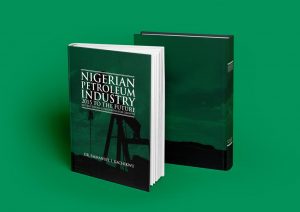 This book is an attempt to capture the policies, programmes, institutions and work that we pushed from the Ministry of Petroleum Resources in four years. It exposes the challenges that we faced as we navigated successfully the turbulent waters of the Nigerian petroleum sector. It is a book focused on highlighting the detailed work of a bunch of technocrats and policy wonks whom I assembled to help me and the President craft interventionist programmes in the industry.
This book is an attempt to capture the policies, programmes, institutions and work that we pushed from the Ministry of Petroleum Resources in four years. It exposes the challenges that we faced as we navigated successfully the turbulent waters of the Nigerian petroleum sector. It is a book focused on highlighting the detailed work of a bunch of technocrats and policy wonks whom I assembled to help me and the President craft interventionist programmes in the industry.
The book also addresses efforts to increase federal government income from the sector; accountability and transparency; regulatory and policy changes; the efforts at restructuring of parastatals and the National Oil Company, NNPC; a review of the business policy environment and funding challenges; addressing infrastructural deficits and repositioning Nigeria’s participation and leadership in global petroleum organisations and programmes; attracting foreign investment into the sector; and of course surviving the day-to-day politics and power play in the industry.
Before the opportunity President Buhari gave me to serve, I was completely inexperienced in public policy issues. However, as at then, I had invested 30 years as a veteran of the private petroleum sector and entrepreneurship. Nothing prepared me for the challenges of this public sector – the rot that the President sought to change, the infrastructure deficit that was killing the sector, the policy gaps that urgently needed review and refill, nor the interest blocks and internal power plays that were positioned always to hold captive the sector and the Ministry.
I underestimated the urgency of rework needed for this sector to meet the near wholesale reliance of the nation on it; the probing eyes of public analysts for every action taken and planned, and the challenge of publicity, positive and negative for every action embarked upon in this sector. Needless to say, from June 2015 when the President invited me to Abuja and offered me the opportunity to help lead the industry till May 2019, my life took a different turn; from that of over 50 years of privacy and private sector experience to one of public glare and public sector focused power play. It was a massive learning experience.
I survived till the end of the fruitful tenure due to God’s protection, the President’s strong and calm leadership and tolerance, an unusual bond and support from the Nigerian masses and the backbone of a team of carefully assembled and deeply passionate policy advisers who brought out our passion and hunger for change. Like most public officers, I am sure, I had moments to question my sanity in continuing with and been depressed by the challenges of public office. But in such moments, I took consolation in my belief that from the darkest and most challenging recesses, the lessons of life are garnered.
I continued to be fired up by the Nigerian dream although sometimes I was frustrated by the fact that it unfolds so sluggishly. For me, the oil industry must catapult Nigeria to massive growth and development. The growth referred to include; less ideological emotions and a practical and pragmatic speed towards entrepreneurism, a bullish infrastructural growth, a link between oil resources and energy sufficiency, a diversification from raw crude and gas production (and we should massively grow our real volumes of production of both) to refining and processing. The oil sector must propel a move to greater accountability of our resource earnings and openness of our contractual terms, a less belligerent – attitude towards investors, but yet extracting the best of terms in all deals. The sector must focus on appointing and incentivizing the best talents to run this industry and keep it independent of politicians and politically motivated appointments. The oil sector must encourage the growth of local entrepreneurial capacity to allow local investors grow the scale of local ownership of our petroleum resources and so trap the benefits within Nigeria. We must expose a global vision to reach and control the African market and to superintend the global oil politics within Africa. The oil sector must show a boldness to address the naughty nagging issues that hold back growth in this sector – funding, research, subsidy, privatization of infrastructure, removing monopolies, addressing environmental issues headlong, addressing the fiscal and other regulatory policy gaps. The oil sector must create a framework to resolve community issues and allow some level of local participation in the value chain by oil-producing communities and states. We must aggressively pursue oil exploration and alternative energy resource development in all parts of Nigeria, and many more. As you can see, there is not a scarcity of challenges to be confronted, boldly, aggressively and speedily in the Nigerian Petroleum and Energy Sector.
This book chronicles mine and my Teams’ efforts, encouraged by President Muhammadu Buhari, to confront some of these issues. More importantly, it sets a framework for a dynamic future intervention for the sector. I had variously described the challenges facing the sector as creating an URGENCY OF YESTERDAY particularly with the looming global shifting of energy reliance away from crude oil, and the lateness of our total energy sufficiency march.
For most of these problems, the solutions exist but our intervention must be quick, honest, apolitical, creative, adequate and determined.
In the midst of the challenges and uncertainties we faced in the course of our work in this sector, one thing remained certain, I and my team love Nigeria and continue to have faith in our Nation’s ability to do right and do the needful, to allow us Reawaken this giant.